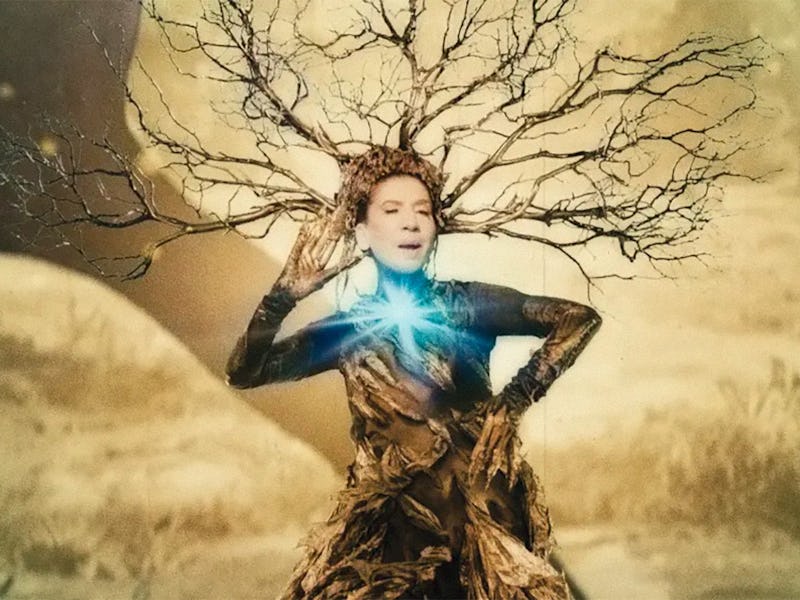Once Within A Time is an Urgent, Futuristic Fairytale
Godfrey Reggio’s latest is an archival dreamscape... and a self-aware warning about climate change.

Experimental filmmaker Godfrey Reggio may not be a household name, but his non-narrative, disarming features have subtly shaped the way we look at our world. Modern-day environmentalism owes a great deal to Reggio: since his assured ‘80s debut with Koyaanisqatsi, the director has been delivering cautionary tales about exploitation and the perils of greed. His films leave their lessons up to the audience — though to the naked eye, it’d be easy to reduce his work strictly to its anti-tech message (and label him a hypocrite for embracing modern film techniques in his work).
Reggio takes any controversy in stride: he once dubbed himself “a Trojan horse” that uses “the coinage of the time in order to raise a question about that very coinage.” The director’s work has always been synonymous with contradiction, but it’s always worked in his favor. Despite the high-tech processes he uses to critique our industrial age, his films frequently give off an air of classicism. His Qatsi trilogy invokes the pioneering work of the Lumiére brothers, and his latest effort, Once Within A Time, was conceived from a similar vintage.
Reggio has emerged from a decade-long hiatus with a renewed sense of urgency. The threat of climate change and the specter of technology are more prevalent than ever before. Rather than turn our gaze to the world around us with humanist imagery, Reggio and co-director Jon Kane embrace an archival, collage-like feel to depict the dawn of a new era... and present a call to action for the next generation.
Once Within A Time may be a fitting entry point for those unfamiliar with Reggio’s work, if only because the film’s target audience skews much younger this time around. That’s not to say the messaging here isn’t just as sophisticated as his most famous works, but there is something here that Reggio’s non-narrative features don’t have: a bardic sense of humor. Once Within A Time is also the most narratively coherent story in Reggio’s oeuvre. The project uses familiar creation fables — the story of Adam and Eve, for one — to chart the beginning of what could be considered the end.
Two schoolchildren play beneath the a sprawling apple tree. When one fruit falls to the ground, it instantly transforms into an anthropomorphic deity, the iconic boom of a Mac start-up heralding its arrival. The birth of technology brings death to the world as we knew it, but the new one that’s replaced it isn’t entirely a wasteland. There is still beauty in the contrasting images that Reggio and co. present the audience, even if so much of it has been challenged by industry.
Antiquity and futurism live side-by-side in Once Within A Time: trio of wolves howl at a monolithic, supersized smartphone, Georges Méliès’ man in the moon imposed on the screen. A group of wide-eyed children stumble across the manifestation of Mother Nature (Sussan Deyhim); her cryptic opera is a welcome break from a lifetime of staring at screens. Each frame seems hand-colored and old as the dawn of film. It’s a fitting depiction of the world that the next generation is inheriting, a world torn between the past and the hereafter.
Past and future lives side by side in Once Within A Time.
Once Within A Time prefers to communicate through sight and sound: a soundtrack from the legendary Phillip Glass and arias by Deyhim are two of the film’s most consistent motifs. It’s not hard to get the message either way... but beyond “children are the future; be wary of technology,” what exactly are we meant to take away from all of this?
The answer is probably more nebulous than most would like. Reggio’s latest is not so much a condemnation of our current landscape as it is a portrait of the new age. At 80 years old, the director has lived through so many unprecedented ages. The world is different, but it’s not unrecognizable. Nor is it beyond saving. But the choice to do so now lies within our grasp. Whether we accept the responsibility or fall prey to new temptations remains to be seen. Tradition and innovation can coexist, Reggio seems to admit — but only if we continue to preserve all that’s come before.
Once Within A Time is currently playing in select theaters.
This article was originally published on